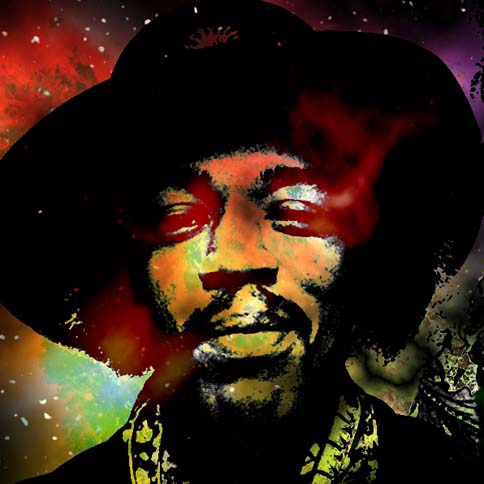
The strory that I chose to highlight on written by Sherman Alexie, was titled "Because My Father Always said He Was the Only Indian Who Saw Jimi Hendrix play 'The Star Spangled Banner' at Woodstock".This particular story expands on more details about the main character Victors father and his experiences in the 1960’s that were described to be very significant. The story begins by Victor describing his father to be a “hippie” present at a protest against the Vietnam War that took place in Spokane. The scene takes an abrupt turn towards violence as the demonstration transforms into an all out slug fest that leaves a National Security Guard severely injured and unconscious. Soon after the incident Victors father was imprisoned for two years for assault with a deadly weapon. In addition he was also said to have been published by the media for right before his initiation of physical violence. For instance, the author states, “…a photograph of my father demonstrating in Spokane, Washington, during the Vietnam War. The photograph made it into the wire service and was reprinted in the newspapers throughout the country. In fact, it was on the cover of TIME.”(Alexie pg 24) After imprisonment, Victors father attended a concert that the featured Jimi Hendrix playing his rendition of “The Star Spangled Banner”, which change his perspective of the world in a negative way. Victor describes his father to be an alcoholic that would continuously play the recording of the song each day while consuming alcoholic beverages until he passed out at the kitchen table. The relationship with his wife was said to be deteriorating throughout the story which eventually led to them becoming divorced. Victor’s mother explains to her son that society was the driving factor that lead to the divorce and the change in character in his father. A segment in the story reads, “On a reservation, Indian Men who abandon their children are treated worse than white father who do the same thing. It’s because white men have been doing that forever and Indian men have just learned how. That’s how assimilation can work.”(Alexie pg 34).

Ray-Ray: did you see Nikki blogged about this story too?
ReplyDeleteI think the quote you end with is interesting. "Assimilation" is a loaded term in Native American history. During the 19th and early 20th centuries, official U.S. government policy focused on "assimilating" Native American children by taking them away from their families, cutting their hair, and putting them in white schools where they weren't allowed to speak their language. There are autobiographical accounts written by some of these children that are harrowing; for example, Zitkala-Sa's "School Days of an Indian Girl" (http://www.wsu.edu/~campbelld/amlit/zitkala.htm).
Other policies targeted adults. Throughout this period, Native Americans were rewarded for assimilating to white culture and speaking English.
So when Alexie writes "That's how assimilation can work," his tone is bitter, and he's showing that assimilation is not always positive, and is never good policy.
Let me start by saying that you did a fantastic job on your presentation this week. Your managed to hit on some important concepts in your presentation on the chapters you discussed such as alcoholism among the Native Americans. Even though you sounded like a weather at a certain point I think that you put together an entertaining presentation , especially the Jimmy Hendrix clip. I personally enjoyed reading the chapter “A Drug Called Tradition” where the main characters ride out to Lake Benjamin from a second largest party thrown in reservation history and begin taking drugs. This chapter brought up interesting concepts on how alcoholism and depression effects the Natives Americans.
ReplyDeleteI felt that the most decisive factor or the main reason why Native Americans used drugs is mainly due to their environment being so poor and there wasn't much of an opportunity to grow and develop to live an American Dream out of it. The quote that really brought out the idea is when Alexie writes about the skeletons being in the past, offering to the terrible history the Native Americans endured, and the skeletons in the future, suggesting that there is not much to look forward to in the reservation life. The quote made the chapter be my favorite in the novel because of how realistically it portrays the Native American life, in the now, through using symbolism. Overall I think that quote summarizes the root of the health problems that face the Native Americans, that lack of opportunity results in little to no motivation which leads to poor life choices.